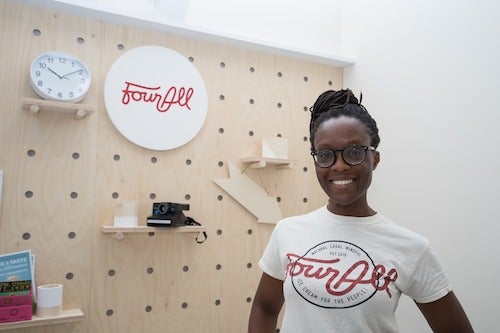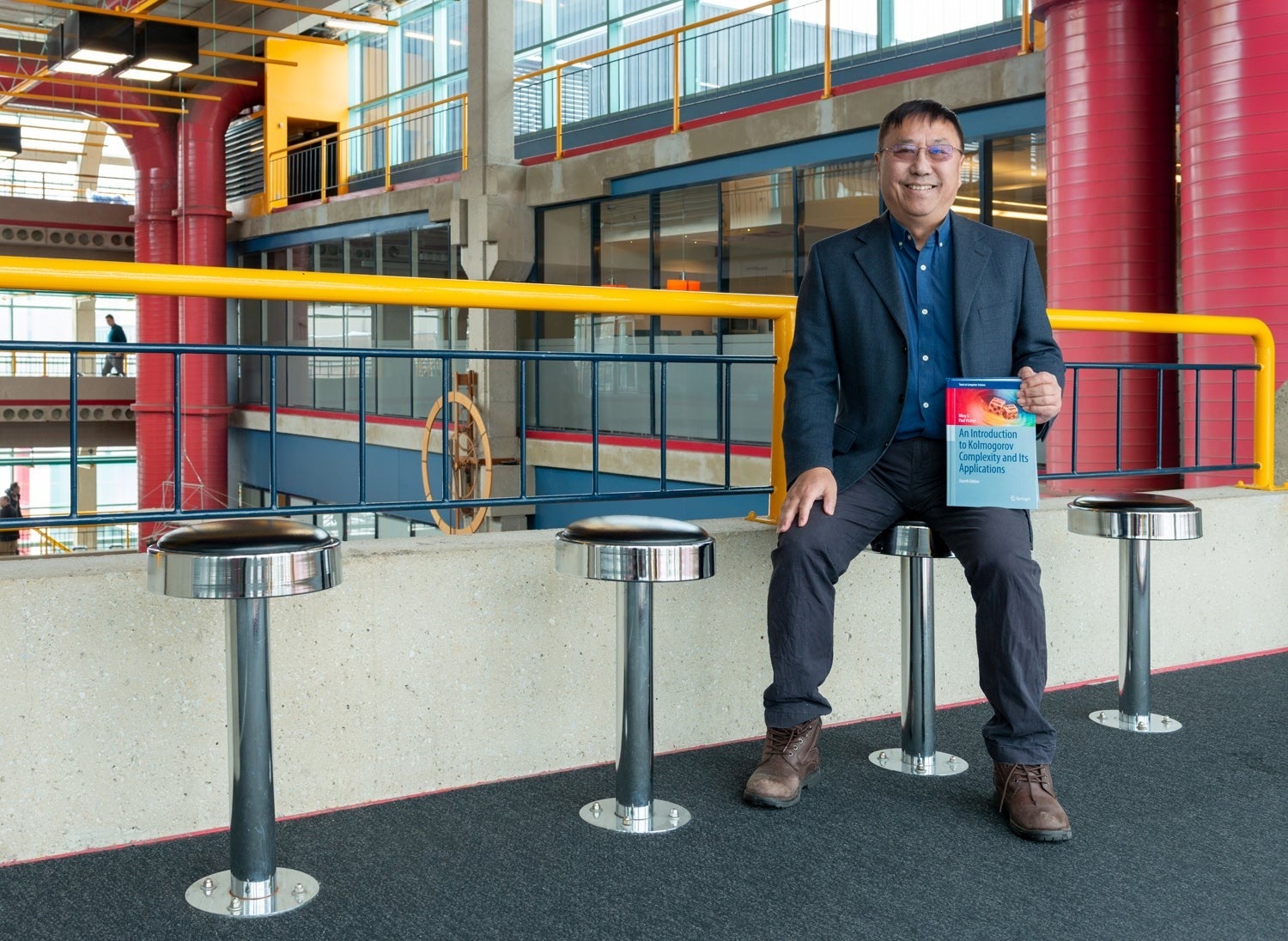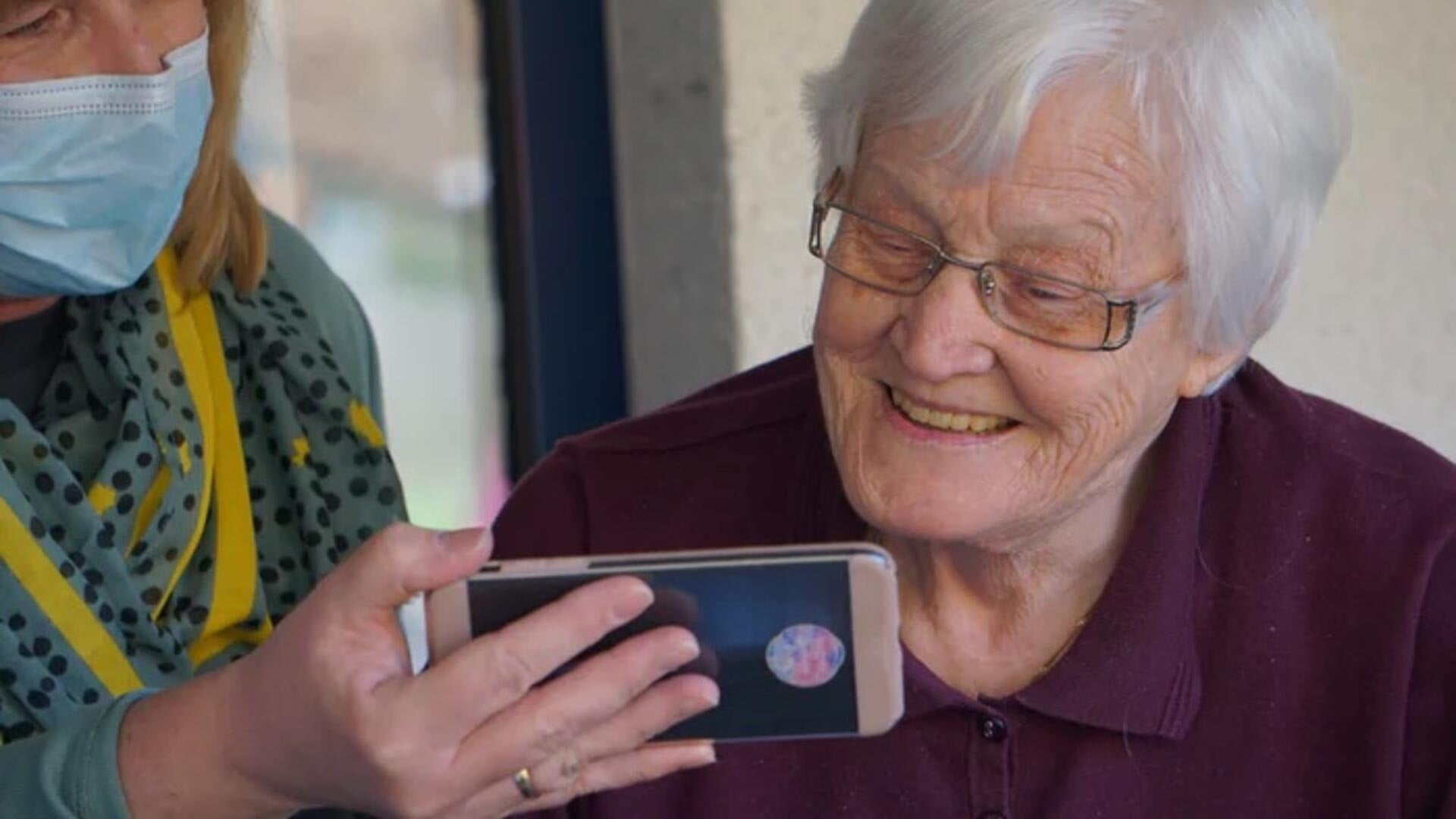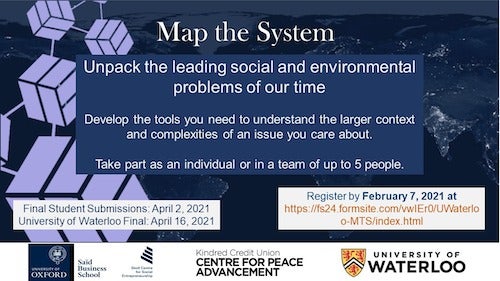Editor:
Brandon Sweet
University Communications
bulletin@uwaterloo.ca
The inside scoop on Four All Ice Cream

By Ryan Antooa. This article was originally published in Waterloo Magazine.
Ajoa Mintah (BASc ’01) has always had a force driving her forward in her life and career. “Part of what I tell myself is that I can do anything and everything, even when I’m at a disadvantage.”
From an early age, Mintah’s mother told her that, as a Black woman, she would have to work three times harder than her peers. She also gave Mintah advice that would serve her throughout her career: “Never say no to yourself.”
After working as a chemical engineer for more than a decade, Mintah approached a crossroads. "I got to a point with my work where I hit a ceiling. I knew I wouldn’t be able to break through as a Black woman. So, I had a choice to make. Am I going to work for someone else and keep trying to break through or build my own house?
“The biggest question I had for myself was, ‘What’s stopping me from doing this?’ I realized I didn’t have to play by someone’s arbitrary rules in my career.”
Mintah’s love for homemade ice cream began during a heat wave when she bought an ice-cream maker instead of an air conditioner. She founded Four All Ice Cream in 2016 and is committed to sourcing local, sustainable and healthy ingredients. Four All’s ice cream factory is in the old Bonnie Stuart shoe factory on Whitney Place in Kitchener. There is also a Four All ice cream shop in Uptown Waterloo.
Process is everything
What may look like a dramatic career change, was actually change set in motion during her undergraduate degree. For Mintah the through-line for her career has always been process.
“I’m a chemical engineer – we design processes for how things are made. It can be applied to everything.”
“Even with Four All, people wanted to know about flavours and I was more concerned with the how of each and every process behind taking raw ingredients and creating something great.”
Problem-solving and creating processes are skillsets Mintah says she learned in Waterloo’s chemical engineering program and during co-operative education jobs. "Every co-op experience let me design, describe, document and develop processes, which was crucial for success in my corporate career and for Four All," says Mintah. Even with Four All, people wanted to know about flavours and I was more concerned with the how of each and every process behind taking raw ingredients and creating something great."
Read the rest of the article in Waterloo Magazine.
University Professor Ming Li receives lifetime achievement award

This article was originally published on the Cheriton School of Computer Science website.
University Professor Ming Li has received the 2020 Lifetime Achievement Award in Computer Science from CS-Can|Info-Can, the non-profit professional society dedicated to representing all aspects of computer science and the interests of the discipline across the nation. Conferred annually since 2014, the prestigious lifetime achievement award recognizes faculty members in departments, schools and faculties of computer science who have made outstanding and sustained achievement in research, teaching and service.
“On behalf of CS-Can|Info-Can, it is my great pleasure to inform you that you have been awarded a 2020 CS-Can|Info-Can Lifetime Achievement Award in Computer Science,” wrote Kelly Lyons, Chair of the 2020 CS-Can|Info-Can Awards Committee in her letter. “Congratulations on this tremendous recognition by your computer science peers in Canada.”

University Professor Ming Li, the Canada Research Chair in Bioinformatics, is known for his fundamental contributions to Kolmogorov complexity, bioinformatics, machine learning theory, and analysis of algorithms.
“Congratulations to Ming,” said Raouf Boutaba, Professor and Director of the David R. Cheriton School of Computer Science. “Ming is a pioneer in Kolmogorov complexity, which has laid the foundation for a modern information theory. He is also a pioneer in computational biology, having introduced both algorithmic ideas into the field as well as demonstrated how computer scientists can contribute to real-word problems from protein sequencing to develop novel treatments for cancer to analyzing DNA sequencing data for studies in evolutionary biology.”
University Professor Li is the eighth faculty member in the Cheriton School of Computer Science to receive a Lifetime Achievement Award from CS-Can|Info-Can. Previous recipients are University Professor M. Tamer Özsu (2018 recipient), Distinguished Professor Emeritus Don Cowan (2017 recipient), Professor Emeritus Ric Holt (2017 recipient), Distinguished Professor Emeritus Janusz Brzozowski (2016 recipient), University Professor J. Ian Munro (2016 recipient), Distinguished Professor Emeritus Alan George (2015 recipient), and Distinguished Professor Emeritus Frank Tompa (2015 recipient).
About University Professor Ming Li
University Professor Li completed his PhD at Cornell University in 1985, followed by a postdoctoral fellowship at Harvard. In 1988 he joined what was then the Department of Computer Science at the University of Waterloo.
University Professor Li received the prestigious E.W.R. Steacie Memorial Fellowship in 1996. He was named a University Professor by the University of Waterloo in 2009 and won the Killam Prize in 2010 for his contributions in computer science. He is the Canada Research Chair in Bioinformatics, and a Fellow of the Royal Society of Canada, Fellow of the Association for Computing Machinery, and Fellow of the Institute of Electrical and Electronics Engineers.
University Professor Li has contributed significantly to developing a modern information theory and in shaping the field of computational biology. We live in an information society, but what exactly is information? Does a theory govern information-carrying entities similar to what Newtonian mechanics governs in classical physics? The answer is yes, and it is called Kolmogorov complexity — a field that University Professor Li and his colleagues introduced to computer science and have extended to many other fields.
Kolmogorov complexity and its applications
Kolmogorov complexity provides a universal measure of information, information content, and randomness. University Professor Li and his colleagues have extended Kolmogorov complexity to two sequences that leads to a universal metric of information distance. They have also connected information to thermodynamics and computed the ultimate thermodynamics cost of creating or erasing a sequence. This has led to zero-shot learning — a problem widely studied in computer vision, natural language processing and machine perception in which, at test stage, a learner recognizes objects from classes not previously seen at a training stage.
Read the rest of the article on the School of Computer Science website.
Finding the mental health balance at long-term care facilities

This article was originally published on Waterloo News.
In a study of seven long-term care facilities in New Brunswick, clinical information systems that tracked changes in residents’ status through the lockdowns were found to be crucial in helping homes make decisions over resource deployment.
The homes in New Brunswick successfully used these systems to help keep residents engaged, said John Hirdes, the principal investigator of the study and a professor in the School of Public Health and Health Systems at the University of Waterloo. “They brought in new staff and programs and showed that you can do a good job in terms of mental health during lockdown.”
The strategies used by the homes included window visits and video chats, which were supported by the New Brunswick government through the distribution of iPads. One home hired students to facilitate virtual calls and engage in virtual one-on-one visits with residents. Students were also hired to increase recreation activities within the homes during lockdowns.
Now, as governments continue to weigh restrictions at long-term care facilities, Hirdes said policy makers can use the associated clinical information systems’ outputs to guide resource deployment, and health-service researchers can examine the data to identify better management strategies for when a pandemic strikes again.
“A balance needs to be struck between quality of life and the risk to physical health,” Hirdes said. “When you have large numbers of visitors from the general community, just one asymptomatic person can wreak havoc. These are hard decisions, and this is where clinical information systems are helpful.”
The researchers studied data from seven francophone long-term care homes in the province using a standardized assessment called the interRAI long-term care facility (LTCF) assessment, used by more than 30 countries to inform clinical care and evaluate the effect of strategies geared at improving mental health outcomes. The team reviewed 4,209 assessments from 765 residents between January 2017 and June 2020 and modeled the changes in depression, delirium and behavioural problems over time.
“However, the facilities were not experiencing deaths and COVID-19 cases like in Ontario and Quebec, which would complicate how mitigating strategies are deployed,” Hirdes said.
In the seven homes that were studied In New Brunswick, mental health conditions such as depression, delirium and disruptive behaviour stayed the same, and in some cases, those behaviours even decreased.
“Even though in-person visits with family decreased from 73 per cent to 18 per cent during lockdown, the percentage of residents who experienced depression, delirium and behavioural problems did not increase,” Hirdes said.
In the case of residents with dementia, delirium rates experienced a decrease, possibly because there was less noise and movement in the facility. However, those without dementia had slightly higher rates.
“This study shows that thoughtful use of mitigating strategies and clinical information systems like the interRAI LTCF can help stabilize or improve mental health in long-term care homes, even during a lockdown,” Hirdes said.
The study, “Evaluating the Effect of COVID-19 Pandemic Lockdown on Long-Term Care Residents’ Mental Health: A Data-Driven Approach in New Brunswick,” was published in JAMDA and authored by Caitlin McArthur, Margaret Saari, George Heckman, Nathalie Wellens, Julie Weir, Paul Hebert, Luke Turcotte, Jalila Jbilou and John Hirdes.
Friday's notes

The Kindred Credit Union Centre for Peace Advancement's Map the System competition registration deadline is Sunday, February 7 at 11:59 p.m.
This competition asks students to select a social or environmental issue and to explore, probe, and research all the connecting elements and factors around it. Students can register now.

"Do you want to earn a $5 Tim Horton’s gift card for your opinion?" asks the Writing and Communication Centre (WCC). "The WCC is looking to speak to students who have and have never used our services. We would be grateful if you could spare 45 to 60 minutes of your time to participate in an online focus group and give us your feedback."
If you are interested, sign up online. Sessions will take place on MS Teams between February 22 and February 26, 2021. The deadline to sign up is February 19 at 11:59 p.m.
Beyond the Bulletin Podcast Episode 76

The latest episode of the Beyond the Bulletin podcast is now live. Roderick Slavcev, a professor in Waterloo’s School of Pharmacy who is cross-appointed to chemical engineering, discusses his team’s development of a nasal-spray vaccine for COVID-19, and tells us why this is a revolutionary time for science. As Bell Let’s Talk Day combats stigma around mental illness, we tell you about a student and an alumnus who got help. The Schlegel-UW Research Institute for Aging received $2 million to lead two national projects on dementia. And a study warns that flip-flops can make you flip.
Link of the day
When and Where to get support
Students can visit the Student Success Office online for supports including academic development, international student resources, leadership development, exchange and study abroad, and opportunities to get involved.
Instructors can visit the Keep Learning website to get support on adapting their teaching and learning plans for an online environment.
Updated Course templates are now available within your course in LEARN to help you build and edit your content and assignment pages quickly. Support for Winter 2021 is available.
The following workshops, webinars, and events are offered by the KL team (CTE, CEL, ITMS, LIB):
Independent Remote Course Design Essentials. Self-directed, continuous self-enrollment course in LEARN.
Getting Ready to Facilitate Online Courses: TA Training, Monday, January 18, 2021, 8:30 a.m. to Friday, February 12, 4:30 p.m.
Introduction to Bongo Video Assignment (Technical Session), Friday, February 5, 1:00 p.m. to 2:00 p.m.
NEW - Learning from Our Remote Teaching Experiences (CTE7009), Tuesday, February 23, 1:00 p.m. to 2:30 p.m.
NEW - Introduction to Assessments in PebblePad (ATLAS) (CTE7512), Monday, March 8, 2:00 p.m. to 4:00 p.m.
Employees can access resources to help them work remotely, including managing University records and privacy of personal information. Here are some tips for staying healthy while working from home.
Stay informed about COVID cases on campus by consulting the COVID case tracker.
Whether you’re a student or faculty member, the Writing and Communication Centrehas virtual services and programs to help you with all of your academic writing needs. This term we have added evening and weekend one-to-one appointments with our peer tutors, and our NEW one-to-one workshops, where you can learn the content directly from one of our writing advisors.
- Undergraduates: Work with us to brainstorm, draft, revise, and polish your assignments in one-to-one appointments. Ask questions and learn writing tips at our Instagram Live Q&A sessions, and beat isolation while improving your writing skills at the weekly PJ-friendly writing groups.
- Graduates: Meet with our advisors in one-to-one appointments. Join the online writing community at the Virtual Writing Cafés, learn how to present your work at Speak Like a Scholar, or get moving on your dissertation at Dissertation Boot Camp.
- Faculty and Instructors: Request custom workshops for your courses, join the Waterloo writing community at the Virtual Writing Cafés, or make progress on your article, book, or chapter in one-to-one meetings with our faculty specialist.
We understand that these circumstances can be troubling, and you may need to speak with someone for emotional support. Good2Talk is a post-secondary student helpline based in Ontario, Canada that is available to all students. If you feel overwhelmed or anxious and need to talk to somebody, please contact the University’s Campus Wellness services, either Health Services or Counselling Services. You can also contact the University's Centre for Mental Health Research and Treatment.
The Library has published a resource guide on how to avoid information overload.
The Faculty Association of the University of Waterloo (FAUW) continues to advocate for its members. Check out the FAUW blog for more information.
The University of Waterloo Staff Association (UWSA) continues to advocate for its members. Check out the UWSA blog for more information.
The Indigenous Initiatives Office is a central hub that provides guidance, support, and resources to all Indigenous and non-Indigenous campus community members and oversees the university Indigenization strategy.
WUSA supports for students:
Peer support (Visit https://wusa.ca/peersupport to book an appointment):
- MATES – Available Monday to Friday, 10:30 a.m. to 9:30 p.m.; Saturday and Sunday, 10:30 a.m. to 5:30 p.m. (online only)
- Support sessions available in the following languages: Cantonese, English, Hindi, Mandarin, Portuguese, Punjabi, Spanish, and Urdu.
- Glow Centre – Available Monday to Friday, 4:00 p.m. to 8:00 p.m. (online only)
- RAISE – Available Monday to Friday – Varied hours (online only)
- Women’s Centre – Available Monday to Friday, 2:00 p.m. to 5:00 p.m. (online only)
Bike Centre – Will be reopening soon. Check https://wusa.ca/bikecentre for current operating times.
Campus Response Team, ICSN, Off Campus Community and Co-op Connection all available online. Check https://wusa.ca for more details.
Food Support Service food hampers are currently available from the Turnkey Desk on weekdays from 7:30 a.m. to 7:00 p.m. in the Student Life Centre. If you have any questions please email us at foodsupport@wusa.ca.
Centre for Academic Policy Support - CAPS is here to assist Waterloo undergraduates throughout their experience in navigating academic policy in the instances of filing petitions, grievances and appeals. Please contact them at caps@wusa.ca. More information at https://wusa.ca/services/centre-academic-policy-support-caps.
WUSA Commissioners who can help in a variety of areas that students may be experiencing during this time:
- Equity – equity@wusa.ca
- Co-op and Experiential Affairs – coop.affairs@wusa.ca
WUSA Student Legal Protection Program- Seeking legal counsel can be intimidating, especially if it’s your first time facing a legal issue. The legal assistance helpline provides quick access to legal advice in any area of law, including criminal. Just call 1-833-202-4571.
Empower Me is a confidential mental health and wellness service that connects students with qualified counsellors 24/7. They can be reached at 1-833-628-5589.
When and Where (but mostly when)
Healthy Warriors at Home. Free programming including Online Fitness, Health Webinars, Personalized Nutrition and more from Warriors Athletics and Rec. Open to students, staff, faculty and alumni. Register today.
Renison English Language Institute continues to offer virtual events and workshops to help students practice their English language skills.
Warriors vs. Laurier Blood Donation Battle. Join your fellow Warriors, donate blood and help us win the Blood Battle against Laurier for a second year in a row. Set up a profile or add the PFL code: UNIV960995 to your account if you have a blood.ca account already. Questions? Contact WarriorsInfo@uwaterloo.ca.
Warrior Rec Free Programs for Students, January to February.Wide range of free opportunities available to keep students active and healthy including:Fitness Classes (On-Demand), Health and Mindfulness Webinars, Personalized Nutrition Guides, Personal Training Consultations, Small Group Training and Warrior Reset. Register today.
Drop-in to Warrior Virtual Study Halls on Wednesdays from 5:30 p.m. to 7:00 p.m. Come together in this virtual space to set goals and work independently or in groups each week.
Warriors truLOCAL Kickback Program, January 20 to February 20. Support your Warriors varsity teams by purchasing a pre-set truLOCAL box filled with the best quality locally sourced meat and fish. Find out more information and purchase a box today.
Warriors Think Pink (Shoot for the Cure) Campaign, Monday, February 1 to Sunday, February 7. Join your fellow Warriors for free online HIIT Classes, Esports Tournament and hair cutting as we create awareness and raise funds for the Breast Cancer Cause at the Canadian Cancer Society. Find out more now.
Virtual Writing Café, Friday, February 5, 8:00 p.m.
Intellectual Property Presentation Series - IP101 & Commercialization, Friday, February 5, 1:00 p.m. to 2:30 p.m., virtual event through WebEx, register today.
Managing Personal Wellness in a Global Pandemic: Breaking Free From Low Mood, Tuesday, February 9, 10:00 a.m.
Managing Personal Wellness in a Global Pandemic: Motivating Yourself Through Habit Change, Tuesday, February 9, 2:00 p.m.
English Conversation Circles, Tuesday, February 9, 3:00 p.m.
Concept Working Session: Building a Canvas for Your Business, Tuesday, February 9, 5:30 p.m., virtual event.